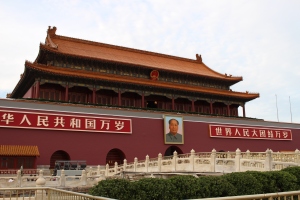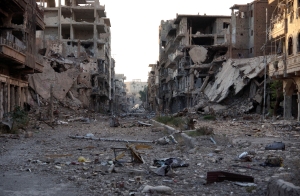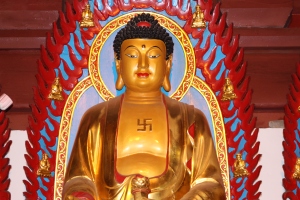Reflections of China
“Empty your mind of all thoughts. Let your heart be at peace. Watch the turmoil of beings, but contemplate their return.” -Tao Te Ching
When I first arrived at the Beijing International Airport I had no idea what time it was because the flight was more than twelve hours long and I was severely deprived of sleep. I ventured through the rather vacant section of the airport that was for international arrivals and somehow made it to the customs checkpoint. There is something very frightening about stepping up to a Chinese customs officer and handing over your passport and airline tickets. This was my first international experience outside of the military and I felt alone in an absolutely massive country where English was not very widely spoken. As a sort of survival response I gravitated towards an American couple. As it turned out they were also there to teach English, except in a rural town in southern China, and they had been teaching in China for a long time.
Language, and our ability to understand it, is essential in communication. Even though there are some signs in English throughout parts of China (especially Shanghai and Beijing), much of the country uses Mandarin as the primary language, which obviously makes sense. As an American, I felt that my knowledge of the language and culture was highly inefficient, but I was willing to learn. I believe this is a key aspect when communicating knowledge of one culture to another. As Americans it seems apparent that so many of us have a highly limited perspective of global awareness . We must understand that there are other cultures beyond our own American culture that really do matter.
The culture and religions of China are ancient, so ancient in fact, that they pre-date the United States of America as a nation. To walk on the Great Wall of China was a very surreal experience and I was even more surprised to learn from my tour guide that the wall is more than 5,000 miles long! The Forbidden City revealed interesting facts about the Chinese government prior to the implementation of a communist government. Each section of the city had its own throne room for the emperor or empress of China, and each section was for each part of the government, such as politics, finance, foreign affairs, etc. It is also believe that Chinese people are the ancestors of the dragon, and the emperors were often depicted as a dragon, while the empress was depicted as a phoenix.
I also experienced a little bit of the communist mentality and dedication toward Mao Zedong. With a central government, the People’s Republic of China controls nearly every aspect of their citizens lives. Newspapers are censored, the Internet is censored, and the only two cellular companies in China are owned by the government. In Tiananmen Square, I watched as young and old alike bowed in saluted the massive portrait that hangs of Mao Zedong. I realized at that moment that communism was not dead in China.
With all of that, China is a beautiful place and I saw but a glimpse of the country. Ever since I started teaching I have been telling my students that they need to get out and see the world before they can no longer do so. Experiencing other cultures allows us to appreciate the world as a whole, and not just as something that is far away or strange.
Peace, the Middle East and What We Still Need to Learn
Peace is something that nearly every human being on this planet desires. It is a horrible reality, however, that we will likely continue to have wars that revolve around religious intolerance and failed negotiations for alternatives to war. As educators, it should be our duty to promote peace and compassion for our fellow human beings. We need to help students understand the horrible realities of war and the many ways that it can affect people and where they live. Many human beings in the world today are barely getting by because the city or country that they live in is in a state of war.
On September 11, 2001 America was devastated by terrorist attacks at the hands of fundamentalist Muslims, who believed that they were following the Qur’an. In return we deployed our military to the Middle East just eleven days later. I know this because I was in the United States Navy at the time, and I was temporarily assigned to the USS Theodore Roosevelt (CVN-71), which was one of the first ships that deployed under Operation Enduring Freedom. Thinking back to that moment now, it seems that there was very little time, if any at all, for diplomacy. America reacted out of rage and anger that our nation would be so horribly attacked. The United States government could have never foretold the long lasting affects that still plague the Middle East today, because we chose to go to war.
From a philosophical standpoint, peace is something that will always seems to elude human beings because each culture has its own set of cultural and religious relativisms that will never allow us to see eye to eye. For the Carnegie Endowment for International Peace, a primary concern in the world today is that of terrorism. According to an article by Renad Mansour (2015), Mosul, Iraq is currently under a temporary Islamic State, but the citizens have very little running water or electricity and no Internet or mobile phone network. At the moment, there is a call for the citizens to overthrow the current government, but what would this mean for Mosul, let alone the entire region of northern Iraq? Mansour also wrote that it would be vital for the Sunni community to develop political strategies in order to drive out the Islamic State, but would this no simply bring a civil war to a country that has already experienced far too much war in the past thirteen years?
The Center for Strategic and International Studies is another non-profit organizations that seek to develop a better understanding of the world around us. In 2011 there were a number of Arab revolts against their governments and some viewed the results as successful, but there is still quite a bit of coercion from Islamic States to go back to the way things were before (Alterman, J. B. et al., 2015). The rise of democracy in the Middle East will always be under scrutiny from Islamic leaders, primarily because democracy represents the Western world, which is viewed negatively because it does not follow Islamic laws. Many Americans do not realize the complexity that lies behind Islamic belief, and they certainly do not understand that Sharia law is to be practiced by devout Muslims above and beyond Western law. It is important to understand the basics of all religions in order to have a more comprehensive understanding of the world and how it works.
If we continue to have an illiterate understanding of the various religions and cultures around the world, then we also risk continual repetition of the same mistakes when it comes to ideas such as fighting terrorism in the Middle East. The American government is not so much fighting terrorism, as they are a fundamentalist type of Islam, and the idea of fighting religious belief is foolhardy. At the moment, the best thing that we can do is to improve our own knowledge of the world, but we can also provide humanitarian assistance to those who are directly affected by groups like ISIS. Humanitarian assistance is an excellent way to show those in other countries that Westerners are concerned about what happens in the world today. One of many organizations that work with refugees in Syria and Iraq is Refugee International.
In 2011, Syrians were caught in conflict and thousands upon thousands of Syrian men, women and children have been killed since then. Daryl Grisgraber (2014) reported that one in four citizens are living the neighboring country of Lebanon. This calls for a number of organizations, such as the United Nations, to continue extending efforts of relief to Syrian and other refugees in the Middle East. Because Syria is still under the threat of ISIS, it does not seem that Syrians will be able to return home anytime soon, despite the fact that it has been nearly four years. We should continue to educate students on the reality that there are other human beings in the world that are living in absolutely abhorrent conditions, and it may be up to their generation to continue offering aid for current issues throughout the world.
ISIS or the Islamic State is just one of many global issues that we have in the world today. Such issues have proven that they are not likely to go away soon, if ever at all. Students in schools throughout America should be prepared to wrestle with the numerous issues that in the world today. As a philosophy and religious studies instructor it will be part of my duty to inform my students as much as possible about the current events in the world and how they apply to philosophy as well as religion. It should also be the task of the educator to help their students break out of their mold of international understanding and develop a new comprehension of the world from a global perspective.
References
Mansour, R. (2015). The Fight for Mosul: Learning From the Past. Carnegie Middle East Center. Retrieved from http://carnegie-mec.org/2015/02/11/fight-for-mosul-learning-from-past/i23h.
Alterman, J. B., Malka, H., Sanderson, T. M., Russakis, J., Barber, M., & McCants, W. (2015). Religious Radicalism after the Arab Uprisings. Center for Strategic and International Studies. Retrieved from http://csis.org/program/religious-radicalism-after-arab-uprisings.
Grisgraber, D. (2014). A Daily Struggle to Survive: Syrian Refugees in Lebanon. Refugees International. Retrieved from http://www.refintl.org/policy/field-report/daily-struggle-survive-syrian-refugees-lebanon.
The Improbability of a Unique Planet
Kepler-186f may be 490 light years from Earth but it is also a lot like Earth and it may even be able to sustain life just as Earth does now. For some this may seem like science fiction, but as scientists discover more and more about the distant corners of the universe, they also find that the Earth is not simply the only planet in the universe that is unique. In a universe of countless other planets the odds are astronomical that the Earth is the only planet of its kind that can sustain life. So now we have gone from once believing that the Earth was the center of the universe and that the sun revolved around it to being unique only to this solar system. Is there life on other planets in the universe–perhaps, but right now it is far too difficult to determine such a thing because we simply do not have that technological ability.
Could it be possible for similar types of life to be developing on other planets in the universe just as it has on Earth? Perhaps we will never be able to know such things, but it is also fascinating to speculate the possibility that we may also be able to discover life in other parts of the universe in the future.
The Heart of the Buddha’s Teaching- Part 2
There were many, many sayings that the Buddha taught his followers, but one of the greatest was about suffering and how to embrace it. When we embrace suffering, we are free of it, for it no longer has a hold on the mind. When we allow suffering to rule the mind it is like two strongmen pulling a man away and throwing him in a pit of fire. The man can do nothing to prevent the other men from killing him. This is what it is like when we allow suffering to grip the mind.
Suffering is a way of letting us know that we are alive. Suffering also allows us to connect with other human beings and animals because we can show empathy through compassion and love for them as they go through suffering. We feel pain and we can ignore it (hoping that it will quickly go away) or we can become intimate with the pain- acknowledging that it is there. The way to alleviate the bond of suffering is through the Noble Eightfold Path. This is the path of the Buddha and it serves as a guide in this life for those who are open to it.




